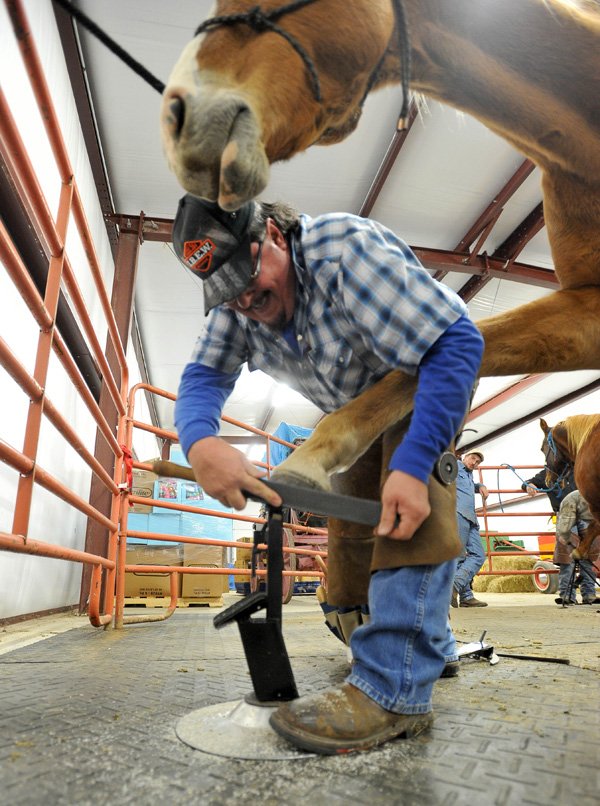SPRINGDALE — The Horseshoeing Program at Northwest Technical Institute has been around for 16 years, but it’s never had a permanent home until now.
School and Rodeo of the Ozarks officials agreed Oct. 17 to let the rodeo use some of the institute’s land for parking and allow the school to use the Don Harp Carriage House at Parsons Stadium for horseshoeing classes, said George Burch, institute president.
The mooing of cows could be heard above the chatter Thursday evening in the carriage house. Students wearing blue jeans and chaps balanced hooves between their legs, cleaned them and fit the horses with new shoes.
At A Glance
Horseshoeing
Northwest Technical Institute’s program consists of four, 12-week, semesters. A student must complete all four semesters to be certified through the institute as a farrier.
• Classes take place from 7 p.m. to 9 p.m. on Thursdays in the Don Harp Carriage House at Parsons Stadium in Springdale.
Source: Staff Report
The Skills
Farrier Facts
Northwest Technical Institutes' horseshoeing program teaches:
• Anatomy of a horse’s legs and hooves
• How to balance a hoof to work on it
• How to clean a hoof
• How to examine the shape of a hoof
• How to shape a horseshoe
• How to put on horse shoes
Source: Staff Report
The program started at the institute, but they needed more space, said Patty Hall, community education director. Locals allowed the class to meet in their barns in Tontitown and Elm Springs, she said.
Richard Farris, 48, is in his second semester in the program and attended classes in the spring in Tontitown. He said the new location is easier for him to get to because he lives in Springdale. He likes knowing the new location is permanent.
“It’s a little more convenient,” he said. “It takes away the unknown.”
The new location isn’t convenient for all students. Dave Ward, 48, said he drives from Pryor, Okla. The barn in Tontitown was 20 miles closer.
The carriage house works well for the classes though, Hall said. It gives the instructors a place to leave supplies because they don’t have to move from barn to barn.
“We’ve never had a place where we could leave our tables before,” she said.
The only challenge with the new location is finding a good place to tie the horses, Farris said. The fence they are using isn’t attached to the ground and could be a safety issue.
At a recent class, someone’s watch started beeping, and the sound frightened one of the horses, said John Werner, instructor. The horse backed up and dragged the fence with it. The movement scared the other horses as well, he said.
Instructors on Thursday discussed installing something permanent to tie the horses to.
In exchange for the use of the carriage house, the Rodeo of The Ozarks will be able to use 10 to 12 acres on the north side of the school for event parking, said Fadil Bayyari, rodeo board member. The rodeo needs more parking space and there aren’t many options because of streets and buildings surrounding the stadium.
“We’re kind of locked in,” he said.
The agreement will also help the rodeo save money, Bayyari said. Instead of investing in more land, money can be spent on updates to the arena.
Bayyari said he isn’t sure yet how much it will cost, but rodeo officials want to level and pave the area near the school.

